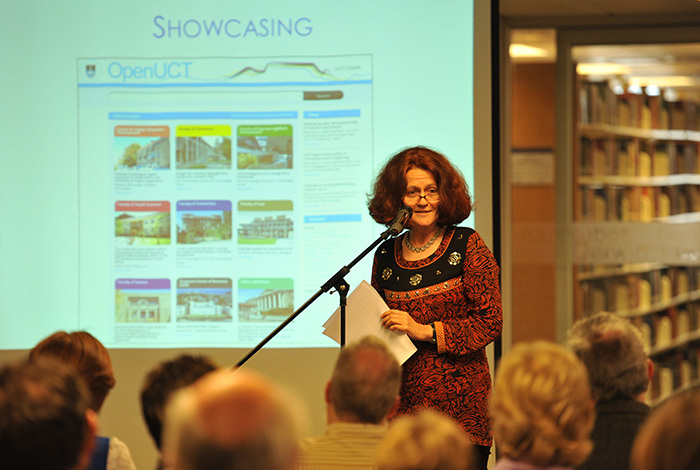Greater strides towards open access
18 August 2014
UCT reached another milestone in its open-access journey last month when the OpenUCT institutional repository was formally launched. The repository will enable UCT lecturers and researchers to legally and freely make available their research, teaching and engaged scholarship resources, to facilitate access, re-use and sharing of materials.
"If you want to go fast, go alone; if you want to go far, go together."
This African proverb served as the inspiration for the collaboration between OpenUCT, the Centre for Innovation in Teaching and Learning (CILT), Information and Communication Technology Services (ICTS), the Research Office, UCT Libraries, and academic contributors in disciplines across the university, which culminated in the newly launched OpenUCT institutional repository, available at http://open.uct.ac.za.
Speaking at the launch, Vice-Chancellor Dr Max Price explained that "the repository is a space in which we as the UCT community can share research, social engagement and teaching materials online with the world– The OpenUCT repository takes a new approach in catering for the preservation, accessibility and discoverability of the full spectrum of our scholarly outputs".
Unlike materials that are simply uploaded online, OpenUCT repository content will be professionally curated, and attention will be paid to ensuring that its resources are easy to find using search engines. It will serve as UCT's default Institutional Repository - a platform for preserving and exposing the scholarly output of UCT that has been developed in line with international open-access principles.
UCT staff will be able to upload any shareable research resources (such as academic papers, working papers and policy briefs), as well as teaching and learning materials (such as lecture notes, videos, simulations and blog posts). Academics must have the right to make that content available openly, either through contracts with journals which allow postprints to be made available, or through open licences such as Creative Commons licences. Master's and PhD theses and dissertations will also be available via an automatic process that will be linked to the examination and graduation process.
Anyone with access to the internet will be able to access the documents shared on this platform. It is intended that the repository will play an important role in increasing the visibility of African scholarship.
Long-standing commitment
The university's commitment to open access and knowledge-sharing dates back to 2008, when then-Deputy Vice-Chancellor Professor Martin Hall signed the Cape Town Open Education Declaration, expressing UCT's support for "creating a world where each and every person on Earth can access and contribute to the sum of all human knowledge". In time, this would lead to what Price referred to as the "democratisation of knowledge".
In 2011, Price – on behalf of the university – signed the Berlin Declaration on Open Access to the Sciences and Humanities. Here, the focus was on new knowledge and research, which (according to Price) would have the following consequences:
- Breaking down physical barriers, so that users would not have to physically be at libraries to access journals;
- Providing greater institutional access, since anyone – not only registered students and academics – could exploit resources situated at specific institutions;
- Posing a fundamental challenge to academic publishing and peer review; and lastly
- Creating a different mindset, especially among scientists, who would put up their raw data for scrutiny.
"UCT strives to share knowledge and scholarly outputs – for the sake of knowledge, but also because it is good for the brand, our reputation, and the presence we have around the world," Price concluded.
Improved webometric rankings
Gwenda Thomas, executive director of UCT Libraries, hailed the repository as "cyber-infrastructure to deliver content and an interface that will knock the digital socks off all other institutional repositories, locally and globally". UCT Libraries' services are responsible for the implementation of the university's open-access policy. Other activities spearheaded by UCT Libraries' services include the setting of metadata standards to make open content visible and discoverable.
Additionally, a library team has been working on improving UCT's position in the webometric rankings, a ranking system based on university web presence, visibility and web access. "Currently the webometric performance of the digital repository (UCTScholar) has yielded great results, indicating that UCT has moved up from 1 746th in the world to 477th, from 46th to 13th position in Africa, and from 22nd to 10th place in South Africa," Thomas revealed. With the launch of OpenUCT, we expect these rankings to shoot up even further – watch this space, she says.
Showcasing scholarly output
Associate Professor Laura Czerniewicz, OpenUCT director, described the repository as "the foundational infrastructure for a vision". She said that the repository is a means to several ends, including a contribution to "meaning-making and knowledge creation in a globalised world".
She praised UCT scholarly output, emphasising that all the effort put into making these resources available and accessible is premised on the fact that UCT produces extraordinary scholarship and teaching resources. "In the process of developing the repository, we discovered how much fantastic research and social responsiveness activity is happening in this institution – and which has been invisible to date. No more!" she declared.
She pointed out that the repository will enhance the ease with which knowledge generated by UCT scholars is found. "Discoverability is a requirement for participation in knowledge networks. What is found becomes what is engaged with, so discoverability is not a nice-to-have, but a condition for scholarly engagement."
She believes that the repository will influence how knowledge is produced and used, as "findable online content shapes what can be known; makes certain knowledge visible and legitimate; and consolidates power through normalisation".
Story by Abigail Calata. Photo by Je'nine May.
 This work is licensed under a Creative Commons Attribution-NoDerivatives 4.0 International License.
This work is licensed under a Creative Commons Attribution-NoDerivatives 4.0 International License.
Please view the republishing articles page for more information.










